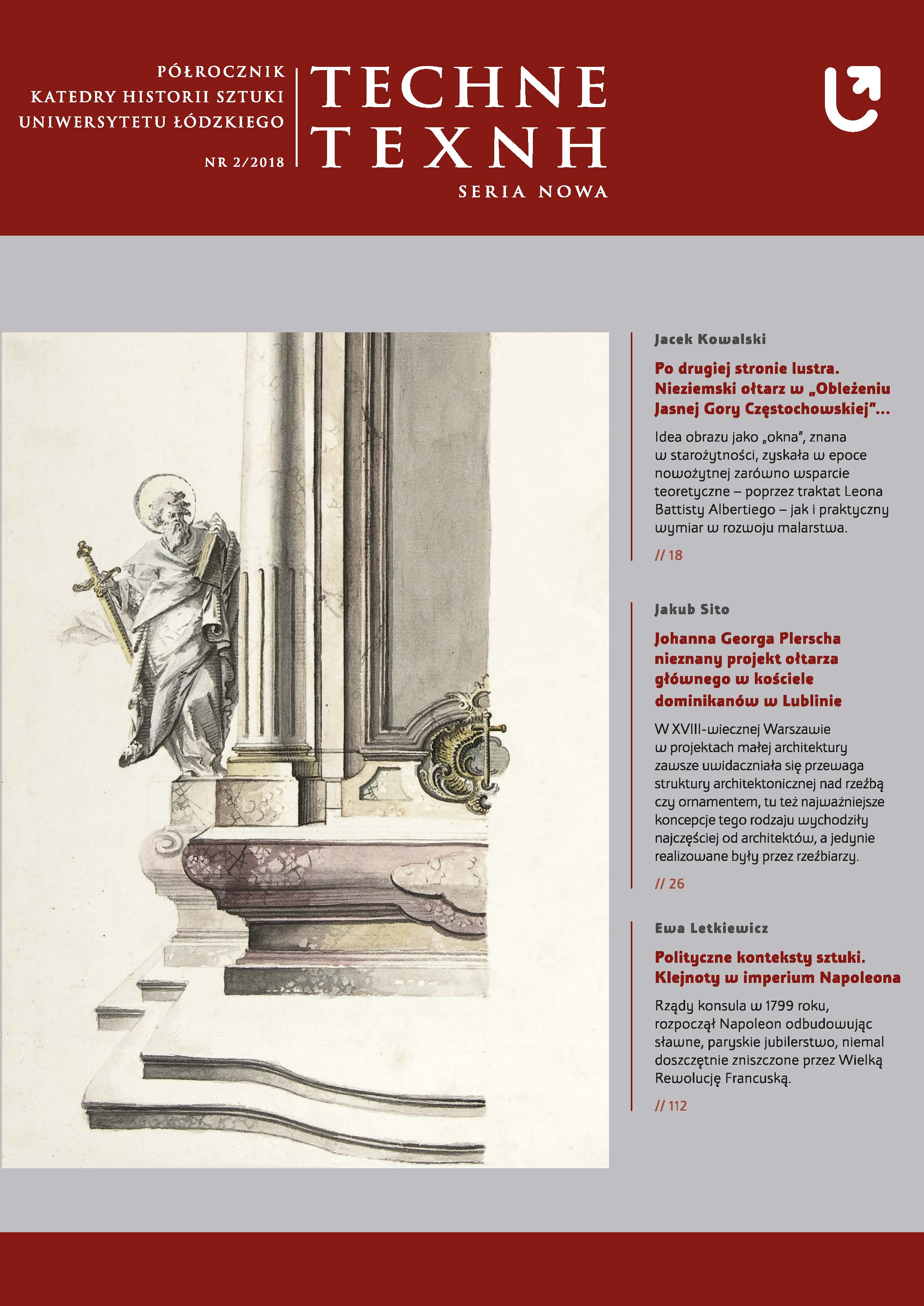Twórczość białoruskiego artysty ulicznego Andrieja Busła
DOI:
https://doi.org/10.18778/2084-851X.06.07Słowa kluczowe:
Europa Wschodnia, sztuka współczesna, mural, street art, miastoAbstrakt
The study focuses on unexamined representations and miscellaneous instances of the diverse creativity of the Belarusian street artist, Andrei Busel (also known as Hutkasmachna). The study was based on interpretative works analysing Busel’s artistic forms of expression: Eternal in Passing. Artwork of European Masters in the Public Space of Minsk, From Streets to Art Gallery. On Reception of Street Art, and Appropriation of Urban Space: Objects, Installations, Interventions. On the basis of selected examples, an analysis of interpretations of relatively obscure works by European masters was performed, as they were placed by Busel in dilapidated and rundown parts of Minsk. These were works by such artists as Leonardo da Vinci, Michelangelo, Sandro Botticelli, Jan van Eyck, Albrecht Dürer, Hans Memling, Jan Vermeer van Delft. When processing the fragments from their works, he applied a mixture of techniques and tools (cut-out, airbrush, prints, posters, paper sculptures, various types of paints, brushes, scissors, glue, and massive sheets of paper). Busel is the first Belarusian artist to move some of his works from the urban space into a gallery (project: Aeternus et momentum, 2011, ‘Ў’ Gallery in Mińsk), where they were in the form of large-format photographs mounted on stretcher bars. The exposition illustrated his artistic creative process: firstly, he reconstructed the European masterpieces in a real space before photographing them, and eventually, using the photographs to redisplay them on canvas. The article also presents other forms of Busel’s illegal appropriation of urban space, such as street-art objects, installations and interventions, e.g., Bridge (2012), or International Baroque. Another issue discussed in the final section of the article is a brand new street-art trend developing in Belarus – the so-called fundamental suprematism (abbreviated to ‘fuprematism’), i.e., the visual interaction of municipal services with the output of Minsk-based street artists.
Bibliografia
Biskupski 2017 – Łukasz Biskupski, Prosto z ulicy. Sztuki wizualne w dobie mediów społecznościowych i kultury uczestnictwa, Warszawa 2017.
Google Scholar
Bobilewicz 2016 – Grażyna Bobilewicz, Есенин и его поэзия в стиле стрит-арт и пабликарт, „Соврменное есениноведение”, Рязань 2016, № 2 (37), s. 27–41.
Google Scholar
Bobilewicz 2016 – Grażyna Bobilewicz, Уличные игры с Владимиром Маяковским, [w:] Пятнами красок, звоном лозунгов...” Книжно-плакатное творчество В.В. Маяковского. Составитель, ответственный редактор В.Н. Тарехина. Редколлегия: В.Н. Дядичев, А.П. Зименков, Н.В. Михаленко, В.Н. Тарехина (сост., отв. ред.), А.М. Ушаков, Москва, Санкт-Петербург 2016, s. 276–286.
Google Scholar
Bobilewicz 2017 – Grażyna Bobilewicz, Поэт в уличной галерее. Портреты Сергея Есенина и Владимира Маяковского, Русская филология. Ученые записки (журнал) кафедры литературы и журналистики Смоленского государственного университета. Ред. М.Л. Рогацкина, Е.Л. Котова, А.А. Азаренков, Т. 17, Смоленск 2017, s. 29–52.
Google Scholar
Dymna/Rutkiewicz 2012 – Elżbieta Dymna, Marcin Rutkiewicz, Polski street art. Wydanie nowe, Warszawa 2012.
Google Scholar
Ganz 2008 – Nicholas Ganz, Świat graffiti: sztuka ulicy z pięciu kontynentów. Pod red. Tristana Manco (tłum. Piotr Amsterdamski), Warszawa 2008.
Google Scholar
Goławska/Lindenberg 2006 – Anna Maria Goławska, Grzegorz Lindenberg, Toskania, Umbria i okolice. Przewodnik subiektywny, Warszawa 2006.
Google Scholar
Gralińska-Toborek/Kazimierska-Jerzyk – Agnieszka Gralińska-Toborek, Wioletta Kazimierska-Jerzyk, Doświadczenie sztuki w przestrzeni miejskiej. Galeria Urban Forms 2011–2013. Experience of Art in Urban Space Urban Forms Gallery 2011–2013, tłum. Marta Koniarek, Biblioteka/Urban Forms Foundation, Łódź 2014, s. 11–23.
Google Scholar
Gralińska-Toborek – Agnieszka Gralińska-Toborek, Graffiti i street art. Słowo – obraz – działanie, Łódź 2019.
Google Scholar
DOI: https://doi.org/10.18778/8142-237-6
Moch 2016 – Włodzimierz Moch, Street art i graffiti. Litery, słowa i obrazy w przestrzeni miasta, Bydgoszcz 2016.
Google Scholar
Schneider 2005 – Norbert Schneider, Vermeer. 1632–1675. Ukryte emocje, Warszawa 2005.
Google Scholar
Trzeciak 1976 – Przemysław Trzeciak, Hans Memling, Warszawa 1976.
Google Scholar
Végh 1983 – János Végh, Van Eyck, Warszawa 1983.
Google Scholar
Virgin and Child on a Grassy Bench by Albrecht Dürer and five copies after it in the collection of the Polish Academy of Arts and Sciences in Cracow, http://arthistory.us/display.php?eid=50 [dostęp 14.10.2018]
Google Scholar
Zöllner 2005 – Frank Zöllner, Leonardo da Vinci 1452–1519, Warszawa 2005.
Google Scholar
-lecie „Modlących się rąk” Albrechta Dürera, https://www.dw.com/pl/500-lecie-modlących-się-rąk-albrechta-dürera/a-3852041 [dostęp 29.10.2018].
Google Scholar
Ольга и Денис Архиповы, «Фупрематизм», http://artaktivist.org/fuprematyzm [dostęp 17.10.2019].
Google Scholar
Андрей Бусел: Aeternus et Momentum. Интервью, http://artaktivist.org/andrej-busel-aeternus-et-momentum-2 [dostęp 15.10.2018].
Google Scholar
Женский костюм в творчестве Альбрехта Дюрера, https://www.livemaster.ru/topic/402549-zhenskij-kostyum-v-tvorchestve-albrehta-dyurera [dostęp 10.10.2018].
Google Scholar
Беременность в искусстве: „Взыграл младенец во чреве её...”, https://www.liveinternet.ru/users/3596969/post157304501/ [dostęp 15.10.2018].
Google Scholar
Pobrania
Opublikowane
Jak cytować
Numer
Dział
Licencja

Utwór dostępny jest na licencji Creative Commons Uznanie autorstwa – Użycie niekomercyjne – Bez utworów zależnych 4.0 Międzynarodowe.








